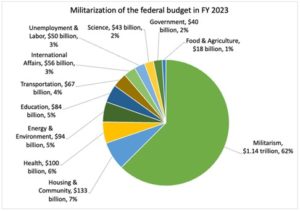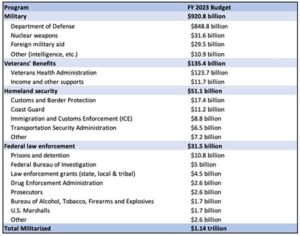
Marty Levine
June 1, 2023
I began writing this as the Congress began to debate the budget/deficit limit agreement that President Biden and Speaker McCarthy reached after weeks of posturing and preening. Last night the Senate added its stamp of approval to the House’s earlier action; only the President’s signature remains outstanding before this compromise becomes the law of the land. My thoughts about how bad this is remains unchanged since no changes were allowed as the two houses “debated” the proposal.

After reading the almost 100 pages of this bill that they wonderfully described as the “bill To provide for a responsible increase to the debt ceiling” I have found great respect for the reporters who have so quickly been able to write their stories of what the budget contained and who would gain and who would be hurt by its provisions. It is dense; it is full of oblique references to specific provisions of specific laws, often referring to them only their statue number, and leaving those who, like me, are not initiated in the cult of law-making, grasping for meaning.
But through that mist what does become clear is that this bill is anything but a serious effort to address the challenges of a growing federal deficit, or the societal problems we face which leave people hungry, sick, and homeless. It is not a serious effort to advance a philosophy of governing or a political value statement. It is certainly not about care and concern for those whose lives are being lived in pain and anguish.
It is about political theater, about having the talking points that will keep power in the hands of those who have it now and appeal to voters when we vote again in 2024.
It is shockingly clear what needed no compromise, and where there was no need for a meeting of the minds. Protected from the very start of these crisis budget discussions were the funds we allocate for “defense.” As I have noted previously when it comes to “defense” spending, there is never a question about how it will be paid for or it is the cause of the growing national debt. There are too many military bases in too many congressional districts, and too many big defense industry donors into too many campaign funds for this government to seriously consider whether defense spending should be reduced to bring national revenue more in line with national expenses.
A recently published analysis of the 2023 budget, a budget created by the Biden Administration, by the National Priorities Project (Institute for Policy Studies) tells us that it was based on our commitment to a set of national priorities that speaks more about power and control than it does about humanity and care. This analysis provides an understanding of how large a slice of the national pie we have taken off the table with strong bi-partisan agreement. It is a budget that spends more than 60% of its discretionary expenditures on defense, policing, and imprisonment.

“In FY 2023, out of a $1.8 trillion federal discretionary budget, $1.1 trillion— or 62% — was for militarized programs that use violence or the threat of violence or imprisonment, including war and weapons, law enforcement and mass incarceration, and detention and deportation…. Less than $2 out of every $5 in federal discretionary spending was available to fund investment in people and communities, including primary and secondary public education, housing programs, childcare programs, federal disaster relief, environmental programs, and scientific research. ”
The areas that were left on the table for discussion are the national investment in people’s lives. It was there that the negotiations were focused and where we are hearing each side claim victory. McCarthy crowed about the historic size of budget reductions he saw in this agreement and was proud that he was forcing people back to work, whether that was possible or not, under threat of losing their food stamps. His MAGA critics were unhappy he did not force even further cuts and more draconian reductions in safety net supports. President Biden was proud that he had kept the reductions as small as he did and poo-pooed the pain of those whose benefits were placed at risk. Only the most progressive voices recognized that budget cuts were not just numbers on paper but were further weakening the already frayed social safety net that too many rely on to meet basic needs.
In this bi-partisan agreement to ignore human needs and protect the defense department’s funding, there was no place for a discussion about how to close tax law loopholes that would expand government funding. There was no discussion about raising taxes on those who have hoarded so much wealth that they can, for example, spend more than $50 million for an 8-day trip to the international space station.
Perhaps the easiest way to see the cynicism of this effort, to see that it is not really about deficit reduction or good budgeting or human needs is to see the inclusion a specific provision which, as described by CBS News, “takes up 25 of the bill’s 99 pages – identifies the pipeline by name and, noting it would carry natural gas more than 300 miles across the Virginias, it says that the pipeline is “required in the national interest” to “increase the reliability of natural gas supplies and the availability of natural gas at reasonable prices.” Those 25 pages will stop an ongoing environmental battle over the dangers of and need for the Mountain Valley Pipeline and ensure that it can be completed, but they will not keep people from going hungry.
In the pages of and pages of specific allocations that are being taken back, and of target figures for budgets in future years, human needs have no place. We have a bi-partisan agreement that our budget should be no more than those numbers, but no targets for how poverty should be erased. Nowhere in this bill is any assessment of the actual human costs of enacting its provisions. The scorecard is solely in dollars and cents. It is about saving money and protecting the wealthy.
as he announced his intention to vote against the agreement, put it well:
“”Deficit reduction cannot just be about cutting programs that working families, the children, the sick, the elderly, and the poor depend upon. It must be about demanding that the billionaire class and profitable corporations pay their fair share of taxes, reining in out-of-control military spending, reducing the price of prescription drugs, and ending billions of dollars in corporate welfare that goes to the fossil fuel industry and other corporate interests.”
Is this the best that our leaders can do? Can they not even take the time to understand the pain they will cause?

Wonderful web site. Lots of useful info here. I’m sending it to a few friends ans additionally sharing in delicious. And obviously, thanks to your effort!